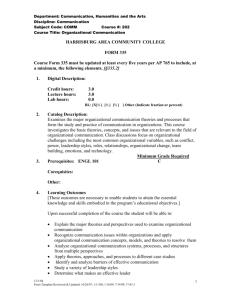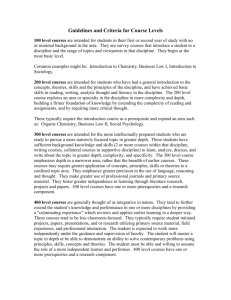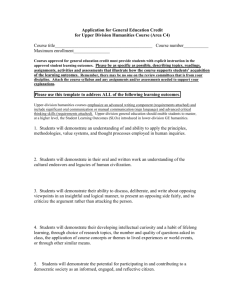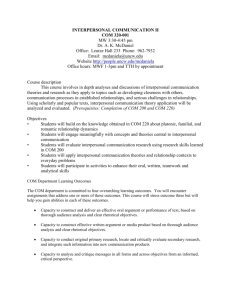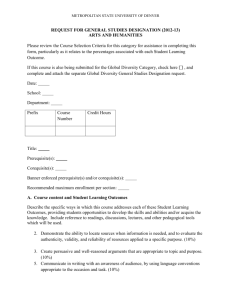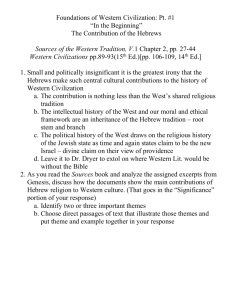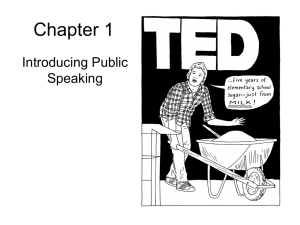Department: Communications, Humanities, and the Arts Discipline
advertisement
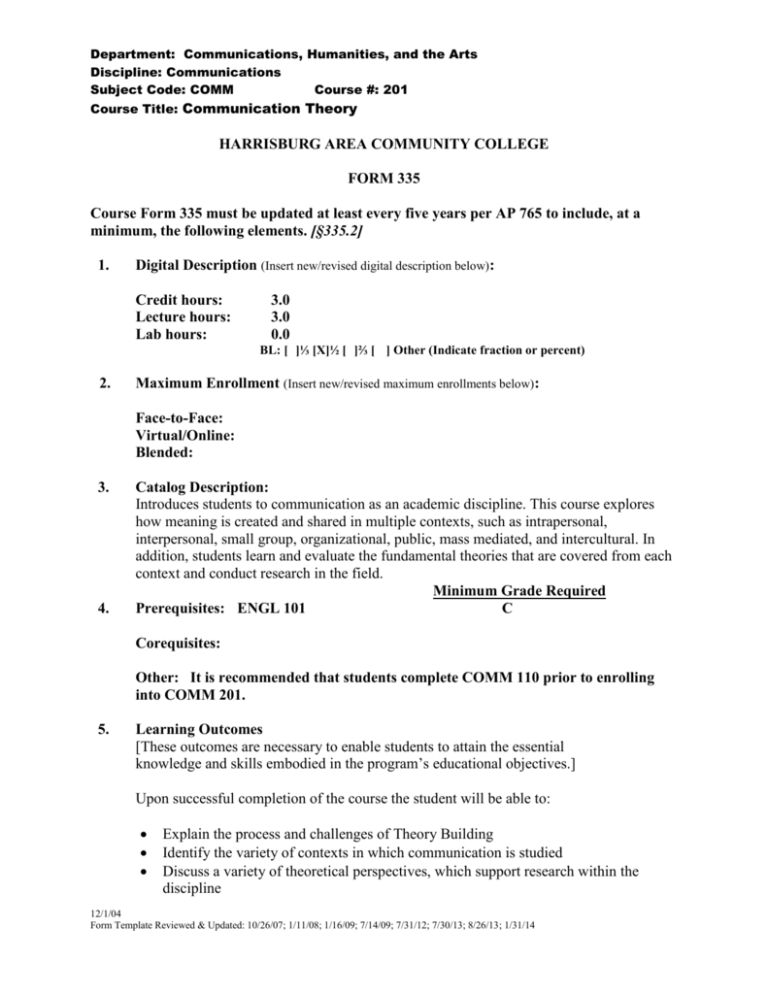
Department: Communications, Humanities, and the Arts Discipline: Communications Subject Code: COMM Course #: 201 Course Title: Communication Theory HARRISBURG AREA COMMUNITY COLLEGE FORM 335 Course Form 335 must be updated at least every five years per AP 765 to include, at a minimum, the following elements. [§335.2] 1. Digital Description (Insert new/revised digital description below): Credit hours: Lecture hours: Lab hours: 3.0 3.0 0.0 BL: [ ]⅓ [X]½ [ ]⅔ [ ] Other (Indicate fraction or percent) 2. Maximum Enrollment (Insert new/revised maximum enrollments below): Face-to-Face: Virtual/Online: Blended: 3. 4. Catalog Description: Introduces students to communication as an academic discipline. This course explores how meaning is created and shared in multiple contexts, such as intrapersonal, interpersonal, small group, organizational, public, mass mediated, and intercultural. In addition, students learn and evaluate the fundamental theories that are covered from each context and conduct research in the field. Minimum Grade Required Prerequisites: ENGL 101 C Corequisites: Other: It is recommended that students complete COMM 110 prior to enrolling into COMM 201. 5. Learning Outcomes [These outcomes are necessary to enable students to attain the essential knowledge and skills embodied in the program’s educational objectives.] Upon successful completion of the course the student will be able to: Explain the process and challenges of Theory Building Identify the variety of contexts in which communication is studied Discuss a variety of theoretical perspectives, which support research within the discipline 12/1/04 Form Template Reviewed & Updated: 10/26/07; 1/11/08; 1/16/09; 7/14/09; 7/31/12; 7/30/13; 8/26/13; 1/31/14 Department: Communications, Humanities, and the Arts Discipline: Communications Subject Code: COMM Course #: 201 Course Title: Communication Theory 6. Compare the seven traditions in the communication field Evaluate major theories in communication Apply theories to personal experiences and global events Explain communication phenomena Engage in the different types of communication research Planned Sequence of Instruction [These must be designed to help students achieve the learning outcomes.] The Nature and Critique of Theory Talking about theory Traditions in theory The Rhetorical Tradition The Semiotic Tradition The Phenomenological Tradition The Cybernetic Tradition The Socio-Psychological Tradition The Socio-Cultural Tradition The Critical Tradition Seven Contexts in the Communication Field Intrapersonal Communication Interpersonal Communication Small Group Communication Organizational Communication Public/Rhetorical Communication Mass/Media Communication Cultural Communication Analyzing theory Conducting research Intrapersonal and Interpersonal Communication Theories Symbolic Interactionism theory Expectancy Violations theory Social Penetration theory Interpersonal Deception theory Uncertainty Reduction theory Relational Dialectics Constructivism Social Judgment theory Group and Organizational Communication Functional Perspective on Group Communication Information Systems Approach to Organizational Communication Cultural Approach to Organizational Communication Critical Approach to Organizational Communication 12/1/04 Form Template Reviewed & Updated: 10/26/07; 1/11/08; 1/16/09; 7/14/09; 7/31/12; 7/30/13; 8/26/13; 1/31/14 Department: Communications, Humanities, and the Arts Discipline: Communications Subject Code: COMM Course #: 201 Course Title: Communication Theory 7. Public/Rhetorical Communication Aristotle’s Rhetoric Burke’s Dramatism Elaboration Likelihood model Mass/Media Communication McLuhan’s Technological Determinism Cultivation Theory Agenda Setting Cultural Communication Cultural Context Anxiety/Uncertainty Management Face Negotiation Theory Speech Codes Genderlect Assessment of Student Learning [Methods of assessment should be appropriate for Learning Outcomes listed above.] Assessment of student learning outcomes for the course, as required by AP 765, is part of regular curriculum maintenance and/or improvement. The specific plan has been determined by the pertinent faculty involved and is maintained in the College’s assessment management system. 8. List of Texts, References, Selected Library Resources or other Learning Materials (code each item based on instructional use): C-Lecture/Laboratory, A-Lecture, BLaboratory, LC-Lecture/Clinical, CLN-Clinical, I-Online, BL-Blended, D-Independent Study, P-Private Lessons, E-Internship, F-Cooperative Work-Study, FE-Field Experience. [These resources must be easily accessible to students.] Griffin, Em. A First Look at Communication Theory, 8th Edition. West, Richard & Lynn Turner. Introducing Communication Theory: Analysis and Application, 4th Edition. Littlejohn & Foss. Theories of Human Communication, 9th Edition. 9. Prepared by Discipline Faculty Proponent: Laura Davis Date: 12/1/13 10. Approved by Department Chairperson: Date: 3/4/14 11. Approved by Associate Provost: Tim Dolin Date: 3/5/14 This course meets all reimbursement requirements of Chapter 335, subchapters A / B. 12/1/04 Form Template Reviewed & Updated: 10/26/07; 1/11/08; 1/16/09; 7/14/09; 7/31/12; 7/30/13; 8/26/13; 1/31/14 Department: Communications, Humanities, and the Arts Discipline: Communications Subject Code: COMM Course #: 201 Course Title: Communication Theory This course was developed, approved, and offered in accordance with the policies, standards, guidelines, and practices established by the College. It is consistent with the college mission. If the course described here is a transfer course, it is comparable to similar courses generally accepted for transfer to accredited four-year colleges and universities. 12. Director, Curriculum Compliance: Erika Steenland Date: 3/5/14 13. Provost & VP, Academic Affairs: Cynthia A. Doherty, Ph.D. Date: 3/7/14 14. Original Date of course approval by the college: 201320 15. Date(s) of subsequent reviews [Indicate change: Learning Outcomes; textbook(s)]: Division Approval for New Course September 7, 2011 ck Type of Instruction/Blended Ratio, 12/1/13 12/1/04 Form Template Reviewed & Updated: 10/26/07; 1/11/08; 1/16/09; 7/14/09; 7/31/12; 7/30/13; 8/26/13; 1/31/14

